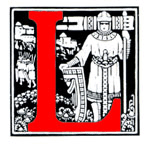[In an article on the movement for the Second Reform Bill that indicts Thomas Carlyle's for popularizing the idea that “Might is Right,” Fraser’s Magazine relates treatment of those wanting extension of the franchise to Governor Eyre's brutal treatment of the Jamaican rioters, which extended to dozens of summary executions and floggings of 600 women and men — all this weeks after any insurrection had ended. In the first lines below the author argues that abundant evidence disproves the claim advanced by Punch and others that the Baptists and other Evangelical groups who met in London's Exeter Hall in any way caused the riots. — George P. Landow

ord Derby has surely not been misled by his military or fashionable acquaintances into thinking that the determination to have this Jamaica tragedy sifted to the bottom is, or ever was, confined to Exeter Hall.
There is reason to believe that the notes of Gordon's trial published by the leading journal are the official notes, and we probably know as much of that case as we ever shall know. There is no longer room for the shadow of a doubt that he was hanged as a troublesome or dangerous character — for what was thought seditious language, rather than for actual complicity in this specific outbreak. This is clear from Mr. Eyre's letter to General O'Connor (Oct. 22), in which he says: 'I have duly read the papers referred to, and I fully concur in the justice of the sentence, and in the policy of carrying it into effect. There can be little doubt, I think, that, whatever Mr. Gordon's intentions may have been, it is entirely due to his agitation, bad advice, and seditious language amongst the peasantry of this colony, that the rebellion broke out, and the massacre of so many gentlemen and the destruction of so much property ensued.' Intention is commonly considered as the essence of guilt; but the Governor was not alone in his theory of evidence or crime: all the officers who had anything to do with the trial or execution agreed with him; and the notions of what is called the best English society — of Mr. Lowe's 'top' — are still rather vague upon the point. On a friend of ours remarking at a dinner party of fine ladies and gentlemen, that the parallel case would be to carry Mr. Bright, the day after his Irish speech, to Dublin, and hang him for Fenianism, they one and all exclaimed, 'And a very good thing too.' What was meant as a reductio ad absurdum, was accepted as an apt enforcement of their views. Let every possible allowance, therefore, be made for Mr. Eyre, if, as we believe, he acted for the best; but it might be as well not to challenge controversy touching the strictly legal quality of his acts.
Murder is an ugly word; but a man who kills another in a fair duel is in the eye of the law guilty of murder; and when this word was applied to the execution of Gordon, there was no necessity for Sir John Pakington's assuming that Mr. Eyre's character as a man of honour was impeached. Indeed, it was the height of imprudence to challenge Mr. Bright to a repetition and justification of the epithet. 'No doubt, sir,' said the right honourable baronet, 'justice must be done; but, on the other hand, let us remember that if Governor Eyre did err — if he were betrayed into an accident— it is not we, sitting calmly and safely in England, who are fitted to judge him.' Now, it is precisely we, sitting calmly and safely in England, who are fitted to judge him; and we must judge him, or he will never be judged at all— making, of course, full allowance for his position. A late Baron of the Exchequer had the misfortune to insert the wrong name in a deathwarrant, which was acted on. On being told of the mistake and its consequences, he exclaimed, 'Bless my soul! it is a most unlucky accident!' He was an amiable and excellent man, although somewhat puzzle-headed, and we should have been sorry to hurt his feelings or those of his friends; but, to avoid the recurrence of such accidents, it might have been advisable, perhaps, to relieve him from all future liability or responsibility of the kind. [493]
Bibliography
“The Reform League and the Parks.” Fraser’s Magazine (September 1866): 404-10. Hathi Digital Library Trust version of a copy of the periodical in the University of Michigan Library. Web. 29 January 2016.
Last modified 28 January 2016